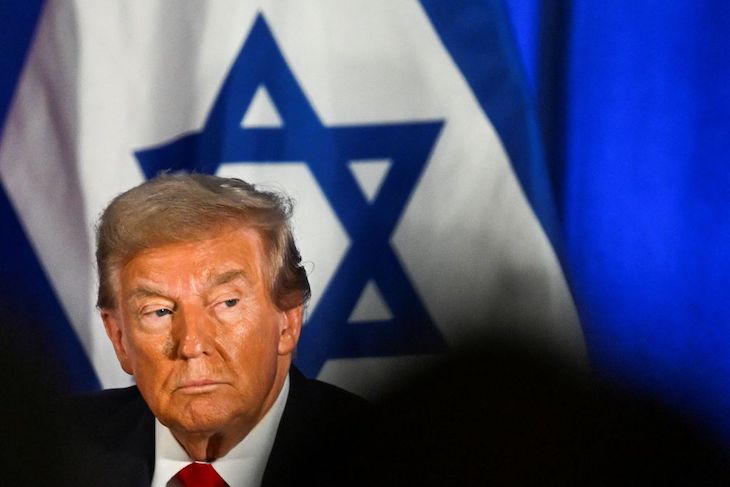MAGA (Make America Great Again) isolationists all agree: the United States must not be drawn into the Israel-Iran war. Donald Trump was not elected president to become entangled in pointless foreign conflicts. Over on Truth Social, Trump’s hokey-pokey routine continues – in, out, in, out, send the Fifth Fleet out? – and America Firsters despair at the prospect of the US fighting ‘a war for Israel’. In Jerusalem, the thinking is the exact opposite: Israeli leader Benjamin Netanyahu is reportedly concerned that the unpredictable Trump could push Israel to conclude Operation Rising Lion before its military objectives are met.
This is all very interesting as Kremlinology, but it also throws up a point of curiosity: why is the US so reluctant to get involved? This is, after all, an offensive conducted by its most reliable ally in the region against a regime where ‘Death to America’ practically doubles as the national anthem. It kills and kidnaps American citizens, funds Islamist groups that commit terror attacks against the US, and pours cash and arms into every conceivable conflict in the region. Lighting up Ayatollah Khamenei like a nuclear Christmas tree would fall squarely in the category of ‘US interests’.
Ah, but Iraq. And Afghanistan. And, for those of a certain vintage, Vietnam. Ever since the last Bell 204B took off from the roof of Saigon’s Pittman apartments, the American collective consciousness has come to associate military invention with bloody and expensive quagmire, an instinct seemingly vindicated by Mogadishu, Afghanistan and Gulf War II. Why is that? The US armed forces are the mightiest military on the planet, a $1 trillion carnage factory that could obliterate an average-sized European country in the space of a morning – before breakfast if nukes were involved.
Is it simply that the US now excels only in aerial firepower in a way it previously also did with boots on the ground?
Is it poor leadership among the joint chiefs; substandard intelligence out of Langley, Fort Meade and Anacostia–Bolling; squeamishness in rules of engagement and norms of armed conflict; or hubris in planning and executing action against nations and forces the Pentagon underestimates as primitive or ill-prepared?
Is it spiritual? Are civic and military elites so macerated in national and civilisational self-hatred, in an anti-Americanism pervasive in higher education, elite media and high-status culture, that they possess neither the confidence nor the will for American victory that were taken for granted among the pre-1960s generations?
If any country should be morally paralysed at the thought of armed conflict, it ought to be Israel
Whatever the answer, it prompts a corollary question: why doesn’t tiny Israel, vulnerable on all fronts, with its own bitter memories of quagmires and retreats, its own self-lacerating institutions, and its own intelligence failures, evince a similar pessimism about military engagement? After all, the Israel Defense Forces (IDF) is a conscript army. In theory, every mother’s son is on the frontline. If any country should be morally paralysed at the thought of armed conflict, it ought to be Israel.
Perhaps in this contradiction lies an answer. Israel’s is a drafted army because the threats the country faces are existential. As October 7 confirmed, it is not only possible but relatively easy to murder large numbers of Israelis in a short space of time. Americans are insulated by oceans and land mass and awesome firepower, whereas Israeli security is a much more fragile thing, not a definite but something that must be won and guarded every single day. American isolationists object to what they regard as foreign wars but for Israel, regardless of the theatre of engagement, every war takes place at home.
The prospect of defeat, and the unbearable price that would come with it, does not grip Israeli leaders with the same paralysing pessimism as afflicts their US counterparts. When the next battle could be your last, wallowing in military or strategic inadequacies is an indulgence that can ill be afforded. The ability to win might well be downstream of the will to survive.








Comments